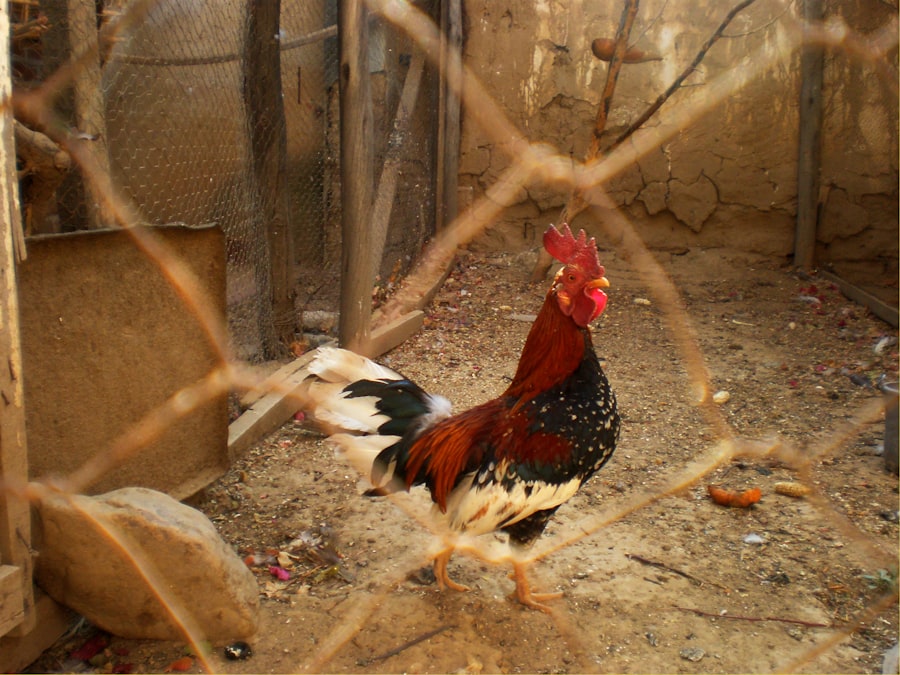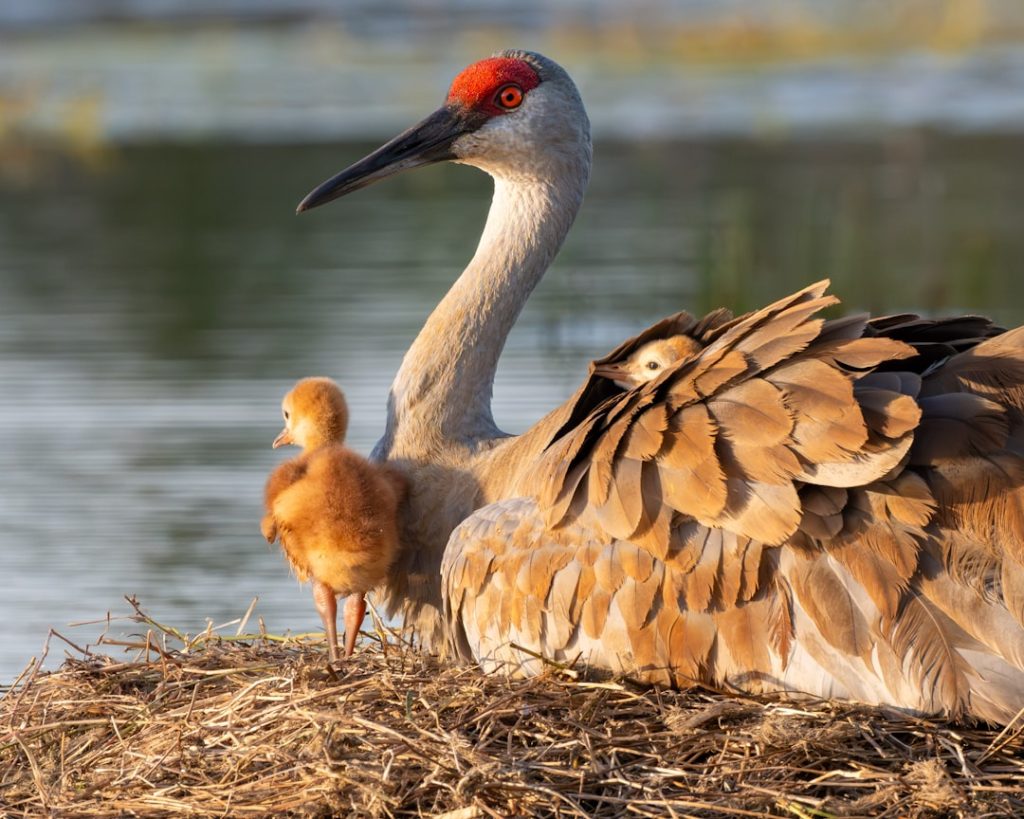Understanding the predators that threaten chicken coops is crucial for effective flock protection. Common predators include foxes, raccoons, coyotes, weasels, snakes, and birds of prey. Each predator exhibits distinct hunting behaviors and coop access methods.
Foxes are known for their cunning nature and ability to dig under fences, while raccoons are adept climbers capable of accessing coops from above. Comprehending these behaviors enables better preparation and implementation of targeted protection strategies. Considering predator activity patterns is also essential.
Raccoons are primarily nocturnal, whereas hawks and eagles are diurnal hunters. This information helps determine optimal timing for security measures such as motion-activated lights or guard animals. By understanding predator habits and behaviors, chicken owners can take proactive steps to safeguard their flocks and ensure their well-being.
Table of Contents
- 1 Securing the Coop
- 2 Installing Motion-Activated Lights
- 3 Using Predator-Proof Fencing
- 4 Utilizing Guard Animals
- 5 Removing Attractants
- 6 Regularly Inspecting and Maintaining the Coop
- 7 FAQs
- 7.1 What are some common predators that may threaten chickens?
- 7.2 How can I protect my chickens from predators?
- 7.3 Are there any natural deterrents for predators?
- 7.4 What should I do if I suspect a predator is targeting my chickens?
- 7.5 Are there any specific precautions to take during the night to protect chickens from predators?
Key Takeaways
- Predators can include animals like raccoons, foxes, and birds of prey, and it’s important to understand their behavior and habits in order to protect your coop.
- Securing the coop with strong locks, latches, and hardware cloth can help prevent predators from gaining access to your chickens.
- Installing motion-activated lights around the coop can startle predators and make them think twice about approaching.
- Predator-proof fencing, such as buried wire mesh and electric fencing, can be an effective barrier against ground-dwelling predators.
- Guard animals like dogs or geese can help protect your chickens by alerting you to potential threats and deterring predators from approaching the coop.
Securing the Coop
Inspect and Repair the Coop
Start by inspecting the coop for any potential entry points, such as gaps in the fencing, loose boards, or holes in the structure. Repair any damage and reinforce weak spots to prevent predators from gaining access.
Additional Security Measures
Additionally, consider adding locks or latches to doors and windows to further secure the coop. It’s also important to keep the coop clean and free of debris that could attract predators. Remove any food scraps or spilled feed that could entice unwanted visitors.
Coop Construction and Materials
Consider using heavy-duty materials for the coop construction, such as hardware cloth or welded wire, to prevent predators from breaking in.
Installing Motion-Activated Lights

Motion-activated lights are an effective deterrent against nocturnal predators such as raccoons and foxes. These lights are triggered by movement, which can startle and deter predators from approaching the coop. Install motion-activated lights around the perimeter of the coop and in areas where predators are likely to approach.
This added layer of security can help keep your chickens safe during the night when predators are most active. In addition to deterring predators, motion-activated lights also provide added visibility for you to monitor any potential threats to your flock. Consider installing lights with adjustable sensitivity and range to ensure maximum coverage around the coop.
By incorporating motion-activated lights into your security measures, you can effectively deter nocturnal predators and protect your chickens from harm.
Using Predator-Proof Fencing
Predator-proof fencing is a crucial component in safeguarding your chicken coop. Choose fencing materials that are sturdy and resistant to tampering from predators. Hardware cloth or welded wire are popular choices for predator-proof fencing due to their durability and ability to withstand attempts at entry.
Ensure that the fencing is buried at least a foot underground to prevent digging predators from gaining access from below. Consider adding an apron or skirt to the bottom of the fencing to further deter digging predators. This additional barrier extends outward from the base of the fence, making it difficult for predators to dig underneath.
Regularly inspect the fencing for any signs of damage or weakness, and promptly repair any issues to maintain its effectiveness. By implementing predator-proof fencing, you can create a secure perimeter around the coop and protect your chickens from potential threats.
Utilizing Guard Animals
Guard animals such as dogs or geese can be valuable allies in protecting your chickens from predators. Dogs are natural protectors and can be trained to patrol the perimeter of the coop and deter potential threats. Geese are also known for their aggressive nature towards intruders, making them effective guardians for your flock.
Introduce guard animals to the coop gradually and provide proper training to ensure they understand their role in protecting the chickens. When selecting a guard animal, consider their temperament and compatibility with chickens. Some breeds of dogs are more suited for guarding livestock, while others may have a higher prey drive.
Similarly, geese should be introduced to the flock at a young age to establish a protective bond with the chickens. By utilizing guard animals, you can add an extra layer of security to your coop and deter predators from approaching.
Removing Attractants

Secure Food and Water Sources
Keep food sources such as chicken feed and water away from the exterior of the coop to prevent attracting predators. Store feed in secure containers that are inaccessible to wildlife and regularly clean up any spilled feed or food scraps.
Eliminate Hiding Spots
Remove any potential hiding spots for predators, such as brush piles or dense vegetation near the coop.
Natural Deterrents
Consider implementing natural deterrents such as predator-resistant plants or herbs around the coop to discourage unwanted visitors. These plants emit strong scents or have prickly foliage that can deter predators from approaching.
By removing attractants and implementing natural deterrents, you can reduce the likelihood of predator encounters and create a safer environment for your chickens.
Regularly Inspecting and Maintaining the Coop
Regular inspections and maintenance of the coop are crucial in ensuring its security against predators. Conduct routine checks for any signs of damage or weakness in the fencing, doors, windows, and other entry points. Repair any issues promptly to prevent potential entry by predators.
Additionally, inspect the surrounding area for any signs of predator activity, such as tracks or droppings, and take proactive measures to address any potential threats. Maintain cleanliness around the coop by regularly removing debris and keeping the area free of attractants that could entice predators. Consider implementing a schedule for routine maintenance tasks such as cleaning, repairing, and reinforcing security measures.
By staying proactive in inspecting and maintaining the coop, you can effectively safeguard your chickens from potential predator threats and ensure their safety and well-being. In conclusion, protecting your chicken coop from predators requires a multi-faceted approach that includes understanding predator behavior, securing the coop, implementing deterrents such as motion-activated lights and predator-proof fencing, utilizing guard animals, removing attractants, and regularly inspecting and maintaining the coop. By taking proactive measures to safeguard your flock, you can create a secure environment that minimizes the risk of predator encounters and ensures the safety and well-being of your chickens.
If you’re looking for tips on how to keep things from getting your chickens, you might also be interested in learning about the importance of the floor of the chicken coop. Check out this article for valuable insights on creating a safe and comfortable environment for your feathered friends.
FAQs
What are some common predators that may threaten chickens?
Some common predators that may threaten chickens include foxes, raccoons, hawks, owls, dogs, and snakes.
How can I protect my chickens from predators?
You can protect your chickens from predators by securing their coop with sturdy fencing, using predator-proof latches on doors, installing motion-activated lights or alarms, and keeping the area around the coop free of tall grass or brush where predators may hide.
Are there any natural deterrents for predators?
Some natural deterrents for predators include using guard animals such as dogs or geese, and planting thorny bushes or shrubs around the coop to discourage predators from approaching.
What should I do if I suspect a predator is targeting my chickens?
If you suspect a predator is targeting your chickens, it’s important to take immediate action to protect your flock. This may include reinforcing the coop, setting traps, or contacting local wildlife authorities for assistance.
Are there any specific precautions to take during the night to protect chickens from predators?
During the night, it’s important to securely lock the coop and ensure that all windows and doors are predator-proof. Using motion-activated lights or alarms can also help deter nocturnal predators.
Meet Walter, the feathered-friend fanatic of Florida! Nestled in the sunshine state, Walter struts through life with his feathered companions, clucking his way to happiness. With a coop that’s fancier than a five-star hotel, he’s the Don Juan of the chicken world. When he’s not teaching his hens to do the cha-cha, you’ll find him in a heated debate with his prized rooster, Sir Clucks-a-Lot. Walter’s poultry passion is no yolk; he’s the sunny-side-up guy you never knew you needed in your flock of friends!







